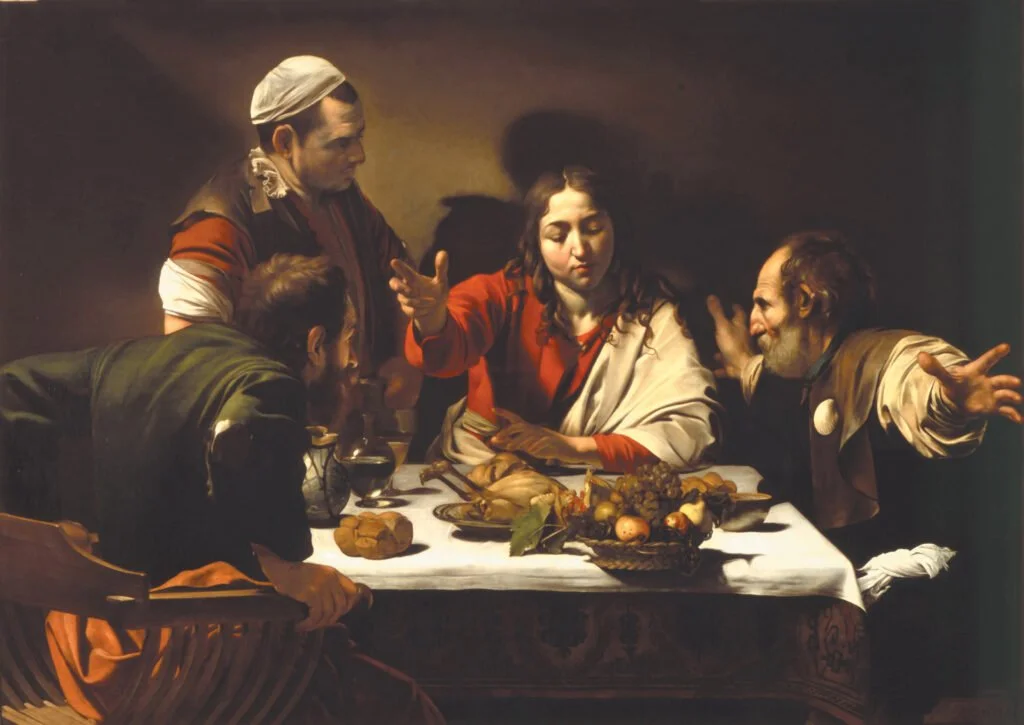Homily for the 22nd Sunday in Ordinary Time
We find Jesus at a banquet on the sabbath. This gives him the occasion to tell a parable with two banquet-related scenarios: being a guest, and being the host. He says that when we’re invited to a banquet, we’re to take not the first place, not the place of honor, but the last place, the place of humility. Likewise, when we host a banquet, we’re to invite not our friends, brothers, relatives, and our rich neighbors who can give us something in return later on, but the poor, crippled, lame, blind, who can give us nothing in return. And we need these instructions from the Lord, because whether in religious life or in the world, it’s not always so appealing to seek the lowest place; it’s not so attractive to give to those who can’t repay us, who we encounter as poor, needy, blind, and so on. But this is the path of humility and of charity. So we can certainly, and profitably, take Jesus’s parable on the plane of a gentle moral correction and exhortation.
But of course the meaning of his parables is always only partially found on their surface. There’s always something deeper. And when we go deeper, often enough we find Christ himself there. So where do we find him in this one? How does this parable deepen our knowledge of Christ?
When Christ hosts a banquet the night before he dies, who does he invite? The poor, the crippled, the lame, the blind? Yes! He invites his apostles, whose spiritual poverty and weakness and neediness and blindness he knows very well, they’ve shown it to him many times. It was here at the Last Supper, of course, that he instituted the sacrament of his body and blood, the Eucharist. And we who are invited, we who are needy, poor, blind, can’t possibly repay him for this gift.
What about when Christ is a guest at a banquet? Does he take the lowest place? Luke doesn’t tell us which place he took or was given at this particular dinner party. But the whole logic of the Incarnation is the logic of taking the lowest place, it’s the logic of humility. Even at the Last Supper when he’s the host, he takes the place of humility, washing the disciples’ feet, and saying, “the Son of Man came not to be served but to be served, and to give his life as a ransom for many.” Christ takes the lowest place by coming down from heaven into our lowly earthly existence, by being born in poverty in a stable, by humbling himself even unto death on a cross, by descending even to hell to free the captives there who were righteous in the Lord’s sight.
And here the logic of humility and of taking the lowest place begins to reveal its fuller meaning. Because Christ didn’t stay down there. He came up out of hell, he rose from the dead, and he ascended into heaven, where he sits at the right hand of the Father, where he intercedes for us. After his death, St Paul tells us, “God highly exalted him”—it’s almost as if the Father is the one saying, “come up higher. You’ve taken the lowest place, but my Son, come up higher.” “God highly exalted him,” Paul says,” and bestowed on him the name which is above every name, that at the name of Jesus every knee should bow, in heaven and on earth and under the earth, and every tongue confess that Jesus Christ is Lord, to the glory of God the Father.”
This is the Paschal mystery in microcosm, and Jesus’s parable about banquets points to it, because it’s all contained in the sacred banquet of the Eucharist. In the Eucharist the sacrifice of Christ is made present to us. He is the one great high priest who offers himself as the one sacrifice for sins, so that we who will share in his death may also share in the exaltation of his resurrected glory.
The notion that Christ is both priest and sacrifice permeates the entire Letter to the Hebrews. So it can help us understand our very striking second reading. The imagery is rather apocalyptic—not only in the sense of reminding us of the end of the world, but in the sense of revealing something hidden. We heard: “You have not come to what may be touched, a blazing fire, and darkness, and gloom, and a tempest, and the sound of a trumpet, and a voice whose words made the hearers beg that no further message be spoken to them.” What’s being described here is the theophany at Mt Sinai in the book of Exodus. There was distance, fear; God couldn’t be touched, not even his holy mountain could be touched except by Moses. And even Moses, the friend of God, trembled to hear his voice up there on the mountain, while the others couldn’t even touch the mountain. But the letter goes on: you haven’t come to that mountain with its storms and fearfulness, no, “you have come to Mount Zion and to the city of the living God, the heavenly Jerusalem, and to innumerable angels in festal gathering, and to the assembly of the first-born who are enrolled in heaven, and to a judge who is God of all, and to the spirits of just men made perfect, and to Jesus, the mediator of a new covenant.” Now that’s quite different, isn’t it! God is no longer feared but praised, by saints and by countless angels—we can think here of Fra Angelico’s beautiful paintings of the happy hosts of heaven worshiping Christ, everyone is smiling and there’s gold and lots of color and musical instruments and everything is shining with merriment. We can also think of the first letter of St John: “That which was from the beginning, which we have heard, which we have seen with our eyes, which we have looked upon and touched with our hands, concerning the word of life—the life was made manifest, and we saw it, and testify to it, and proclaim to you the eternal life which was with the Father and was made manifest to us—that which we have seen and heard we proclaim also to you, so that you may have fellowship with us; and our fellowship is with the Father and with his Son Jesus Christ. And we are writing this that our joy may be complete.” God has drawn near to us in the Incarnation, such that he could be seen, heard, even touched, so that we may have life in him.
If we go back to the Letter to the Hebrews, it goes on to mention that by coming to Jesus, we’ve come “to the sprinkled blood that speaks more eloquently than that of Abel.” What does that mean? Why does Christ’s blood speak more eloquently than that of Abel? What does Abel’s blood say? Abel, of course, is the brother of Cain. And Abel’s offering to God was favored, whereas Cain’s mysteriously was not. And Cain, in envious anger, murders his brother. And the Lord asks him where his brother is, and Cain pretends not to know, and the Lord calls him on it, saying, “the voice of your brother’s blood cries out to me from the ground.” What does it cry out for? Vengeance. This is why the Lord put a mark on Cain, to protect him from the revenge others might take for the death of Abel. So Abel’s blood cries out for vengeance. But Christ’s blood speaks a different word: Christ’s blood cries out not for vengeance, but for pardon and peace, for mercy: he prays from the cross, “Father, forgive them.” Forgive them. Christ’s blood speaks mercy.
There’s another difference between Abel’s blood and Christ’s blood. Abel’s blood cries out from the ground, where it was spilled. But Christ’s blood isn’t in the ground, because Christ isn’t in the tomb. Christ is risen from the dead and ascended into heaven. He’s been exalted, he has gone up on high, bring our own human nature into the heavenly presence of the Father, he’s led captivity captive, he’s our great high priest who continues to make intercession for us from heaven.
And in the Eucharist, we are taken up into that exaltation, into his sacrifice of love. We who are poor and needy are filled with good things. Christ, both priest and sacrifice, invites us to his sacred banquet and himself becomes our food. The memory of his passion is recalled. The soul is filled with grace. And a pledge of future glory is given to us, so that when we’re welcomed into the eternal wedding banquet of the Lamb, his joy will be in us, and our joy will be complete. Amen. Fr. Peter Joseph Gautsch, O.P.

